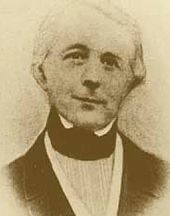Jean-Jacques Willmar
Jean-Jacques Madeleine Willmar (born March 6, 1792 in Luxembourg , † November 26, 1866 in Luxembourg) was a Luxembourg politician.
Life
Jean-Jacques Willmar was the son of the former governor of Luxembourg at the time of the United Kingdom of the Netherlands . In 1814 he completed his law degree in Paris and set up as a lawyer in Luxembourg City. In 1824 he was appointed judge .
Between 1830 and 1839, after the Belgian Revolution , he was a supporter of the Dutch King and Grand Duke of Luxembourg William I. In 1840 he was appointed Attorney General. Between 1841 and 1848 he was a member of the Assemblée des États . After the outbreak of the March Revolution , in March 1848 he became the Luxembourg shop steward in the Committee of Seventeen , which was supposed to draft an imperial constitution on behalf of the German Confederation . From May 31, 1848 to January 2, 1849, he represented Luxembourg as a non-attached member of the Frankfurt National Assembly .
On December 2, 1848, Willmar was appointed Prime Minister and Minister for External Relations, Justice, Culture and Education. However, his government was burdened by tensions with the German Reich , as the finance minister Norbert Metz , who exerted great influence on foreign policy, was pro-Belgian and against Luxembourg's membership in the German Confederation and the Zollverein . Relations with the Netherlands were also strained after King Wilhelm II died in 1849 and his successor Wilhelm III. was represented by his brother Heinrich von Oranien-Nassau . This called for a strictly conservative and restorative policy. On September 23, 1853, Heinrich deposed the government. Willmar's successor was Charles-Mathias Simons .
| personal data | |
|---|---|
| SURNAME | Willmar, Jean-Jacques |
| ALTERNATIVE NAMES | Willmar, Jean-Jacques Madeleine (full name) |
| BRIEF DESCRIPTION | Luxembourg politician |
| DATE OF BIRTH | March 6, 1792 |
| PLACE OF BIRTH | Luxembourg , Grand Duchy of Luxembourg |
| DATE OF DEATH | November 26, 1866 |
| Place of death | Luxembourg , Grand Duchy of Luxembourg |
